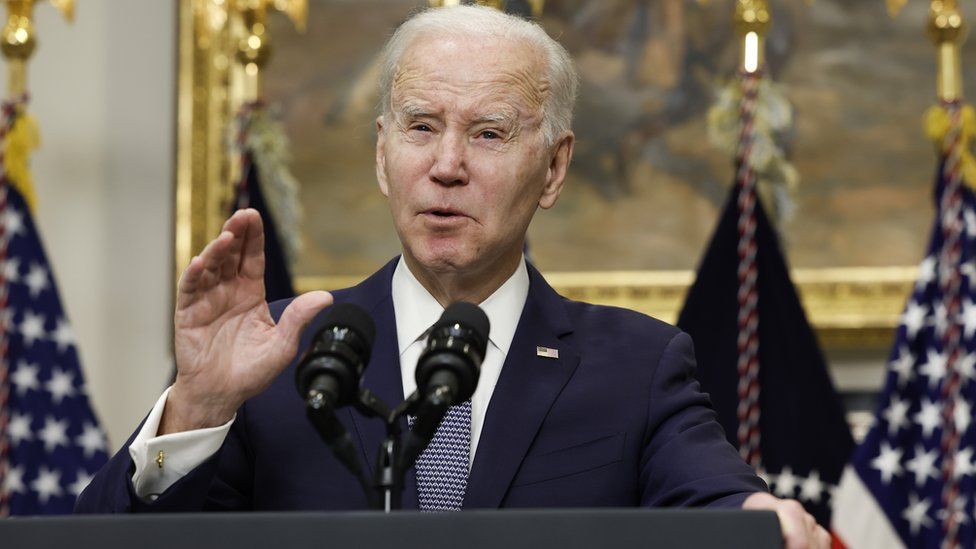
The US will do "whatever is needed" to shore up banks after a string of failures raised fears about financial stability, President Joe Biden said.
His comments came after the US guaranteed all deposits at Silicon Valley Bank and Signature Bank, which both collapsed last week.
The US is trying to stop people taking out funds from banks after SVB collapsed amid a rush of withdrawals.
Americans should "rest assured that our banking system is safe", Mr Biden said.
People and businesses who have money deposited with SVB - the country's 16th largest bank - would be able to access all their cash from Monday, he said.
Taxpayers will not bear any losses from the move, which extends protection beyond the $250,000 (£205,000) in deposits typically insured by the government. The cost will instead by funded by fees regulators charge to banks.
"Let me also assure you we will not stop at this. We'll do whatever is needed," Mr Biden said.
How did Silicon Valley Bank collapse?
SVB - which specialised in lending to technology companies - was shut down by regulators on Friday. It was the largest failure of a US bank since the financial crisis in 2008.
It came after SVB had scrambled to raise money to plug a loss from the sale of assets affected by higher interest rates. Word of the troubles led customers to race to withdraw funds, leading to a cash crisis.
Authorities on Sunday also took over Signature Bank of New York, which had many clients involved in crypto and was seen as the institution most vulnerable to a similar bank run after SVB.
As part of their moves to restore confidence, US regulators unveiled a new way to give banks access to emergency funds, making it easier for banks to borrow from it in a crisis.
But there is concern that the failures, which came after the collapse of another bank, Silvergate Bank, last week, are a sign of troubles at other firms.
US financial markets were roughly flat in early trading on Monday, but shares of many banks were under pressure.
Shares in First Republic bank, which is based in San Francisco, plunged roughly 70% before trading was halted.
Elsewhere, HSBC said it was buying the UK arm of SVB for £1, while authorities in Canada took temporary control of the assets of SVB's branch in the country.
Paul Ashworth of Capital Economics said the US authorities had "acted aggressively to prevent a contagion developing".
"But contagion has always been more about irrational fear, so we would stress that there is no guarantee this will work," he added.
Bailout debate
The US measures have re-ignited debates - similar to those seen following the 2008 financial crisis - about how much the government should do to regulate and protect banks.
Mr Biden called for tougher regulation and emphasised that investors and bank leaders would not be spared.
"They knowingly took a risk... that's how capitalism works," he said.
Still, Republican Senator Tim Scott, seen as a potential presidential candidate in 2024, called the rescue "problematic".
"Building a culture of government intervention does nothing to stop future institutions from relying on the government to swoop in after taking excessive risks," he said.


Once again people are worried about banks. Once again there is intense debate about bailouts. But this isn't 2008.
Following the global financial crisis, the focus was on reforming banks considered "too big to fail". Today's problems are centred around medium- and smaller-sized banks.
Both of the banks that collapsed - Silicon Valley Bank and Signature Bank - had the same thing in common: their business models were too concentrated in one sector and they were over exposed to assets whose values came under pressure from rising interest rates.
The criticism is that they should have foreseen this and they didn't. US Federal Reserve chair Jerome Powell has gone to great lengths to signal the Fed's intention to raise interest rates.
Since most banks are well diversified and have plenty of cash on hand, the assumption is that the risk to the rest of the banking sector is low. That won't stop regulators looking into what went wrong and what rules need to change.
And the pressure on small- and medium-sized banks hasn't gone away. What happens to the US economy and the fight against inflation also remains to be seen.

SVB started as a California bank in 1983 and expanded rapidly as the tech sector boomed. A crucial lender for early-stage businesses in the industry, it was the banking partner for nearly half of US venture-backed technology and healthcare companies that listed on stock markets last year.
The firm came under pressure last year, as its customers increasingly drew on deposits, because higher interest rates were making it more difficult to bring in new money through private fundraising or share sales.
That forced the firm to sell a large portfolio of assets, mostly of US Treasuries, at a loss - news that prompted client withdrawals to accelerate, while raising fears that other banks with large sums of money tied up in bonds could face similar losses.
Central banks around the world - including the US Federal Reserve and Bank of England - have raised interest rates sharply as they fight to stabilise rising prices.
Those moves have reduced demand for bonds with lower yields, which creates a problems for owners, like SVB, if circumstances force a sale.
In Silicon Valley, the reverberations from the collapse have been widespread as companies face questions about what it means for their finances.
Etsy and Roku were among the big-name companies that had money tied up in the bank.
Etsy said it would be forced to delay some payments to sellers as a result, but expected to be able to soon use other payment partners.
from U.S. - Latest - Google News https://ift.tt/fNitKA8
via IFTTT
Tidak ada komentar:
Posting Komentar